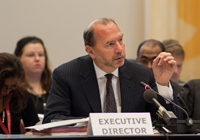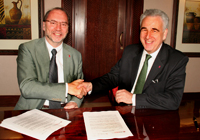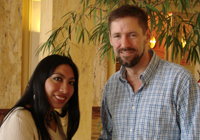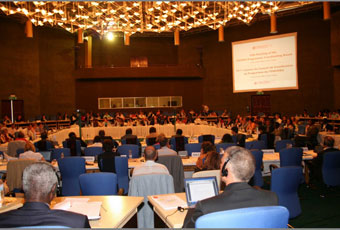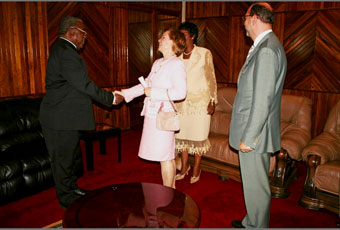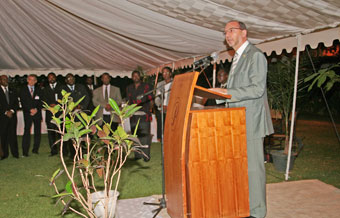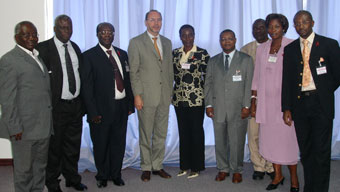
UNAIDS Programme Coordinating Board, Geneva 22 June 2009
Credit: UNAIDS/P.Virot
UNAIDS Governing body, the Programme Coordinating Board (PCB), is holding its 24th meeting in Geneva from 22-24 June 2009 where Mr Michel Sidibé, addressing the board for the first time as UNAIDS Executive Director, will present progress made and his vision for future action.
The focus of thematic session of this PCB meeting is addressing the HIV-related needs of “people on the move”, as decided by the Board in its 22nd meeting in April 2008. The Board noted that improving HIV information and services for these people will enhance the development, promotion and implementation of national, regional and international strategies and will have a significant impact on human rights, including gender.
Meeting the needs of people on the move for HIV prevention, treatment, care and support is essential for achieving universal access. Global movement patterns are particularly complex, involving forced displacement as well as migration. UNHCR figures indicate that there were 16 million refugees, 26 million internally displaced persons due to conflict and an additional 25 million displaced due to natural disasters in 2007, while the International Organization for Migration (IOM) estimates there were over 200 million international migrants in 2008. Most countries are simultaneously, to varying extents, countries of origin, transit and destination. Some countries also have large numbers of mobile people within their borders. It is estimated that there are at least 100-150 million internal migrants in China alone.
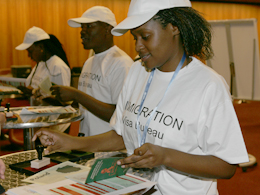
UNAIDS Programme Coordinating Board, Geneva 22 June 2009
Credit: UNAIDS/P.Virot
Mobile populations are sometimes blamed for the spread of HIV, or for increasing the burden on limited services for people living with HIV. In reality, many of the underlying factors driving mobility also increase the vulnerability of mobile populations to HIV infection. Furthermore, migrants, displaced people and other mobile populations living with HIV and those taking antiretroviral medication face additional challenges in obtaining needed care and treatment, which must be addressed. The theme provides wide scope for selecting and discussing issues that often fall between the cracks in national AIDS strategies and in international discussion of forced displacement, internal and international migration and travel.
These include:
- Humanitarian questions of providing displaced and mobile populations security from conflict and violence, including sexual and gender-based violence;
- Employment and other economic issues that motivate mobility and link with connections between HIV, economic survival strategies and the vulnerability of children and young people; potential increases in unsafe, concurrent and commercial sexual contacts;
- Human rights issues in connection with social integration and access to services, and especially in connection with stigma and discrimination against persons living with HIV;
- Immigration and government legislation which dictates the legal status of people on the move, and thus their access to health services; and
- Language barriers to use of health and social services, and health care system concerns, notably with regard to access and continuity of HIV treatment, including for opportunistic infections.
Reducing the vulnerability of migrants and mobile populations to HIV, and reducing the impact of HIV on mobile populations, their families and their homes, transit and host communities, requires intergovernmental cooperation (whether between countries or between ministries within a country). It requires the collaboration of the business sector, labour, health and social services, and vulnerable communities and people living with HIV themselves. Thus the importance of discussing the topic in a Programme Coordinating Board thematic segment that brings member states, civil society and international organizations together.
In order to support a productive discussion in the thematic session of the 24th PCB meeting, UNAIDS developed a background paper on the issue of people on the move —forced displacement and migrant populations. The paper provides basic information on movement of people and discusses the links between mobility and HIV vulnerability, as well as the challenges of ensuring that mobile populations have universal access to HIV prevention, treatment, care and support.
Established in 1994 by a resolution of the UN Economic and Social Council and launched in January 1996, UNAIDS is guided by a Programme Coordinating Board (PCB) with representatives of 22 governments from all geographic regions, the UNAIDS Cosponsors, and five representatives of nongovernmental organizations, including associations of people living with HIV.








